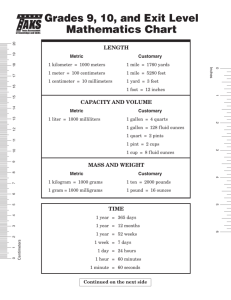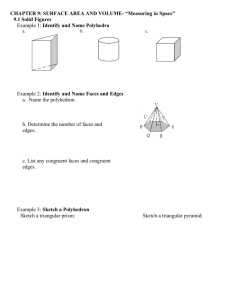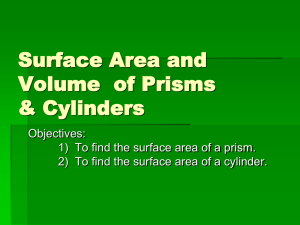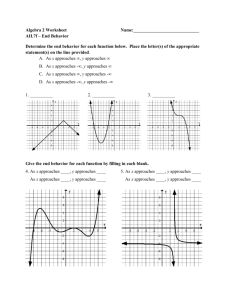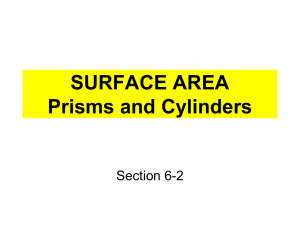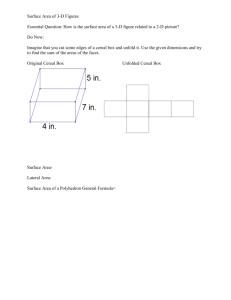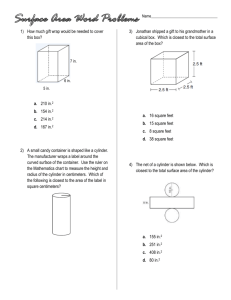Surface Areas of Prisms and Cylinders
advertisement
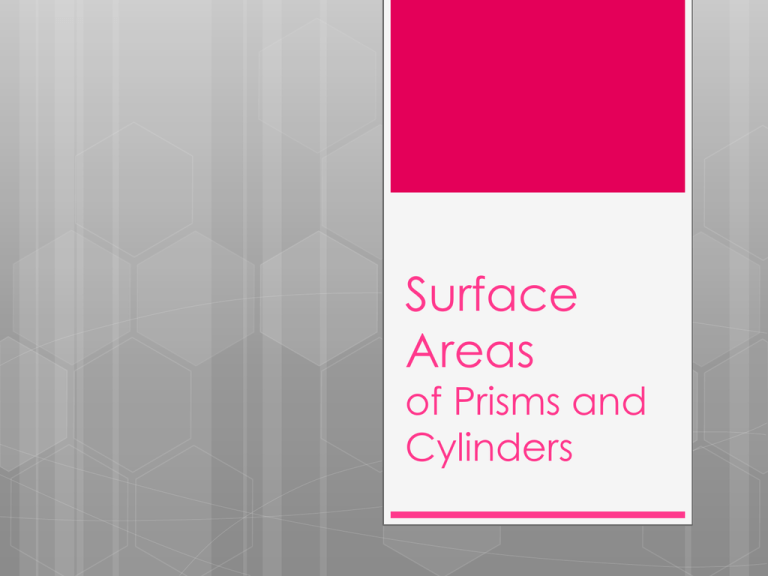
Surface Areas of Prisms and Cylinders Use Dimensions of a Solid to Sketch a Solid Use isometric dot paper to sketch a triangular prism 6 units high, with bases that are right triangles with legs 6 units and 4 units long. Step 1 Mark the corner of the solid, then draw segments 6 units down, 6 units to the left, and 4 units to the right. Use Dimensions of a Solid to Sketch a Solid Step 2 Draw the triangle for the top of the solid. Use Dimensions of a Solid to Sketch a Solid Step 3 Draw segments 6 units down from each vertex for the vertical edges. Use Dimensions of a Solid to Sketch a Solid Step 4 Connect the corresponding vertices. Use dashed lines for the hidden edges. Shade the top of the solid. Answer: Which diagram shows a rectangular prism 2 units high, 5 units long, and 2 units wide? A. B. C. D. Use an Orthographic Drawing to Sketch a Solid Use isometric dot paper and the orthographic drawing to sketch a solid. • The top view indicates one row of different heights and one column in the front right. Use Dimensions of a Solid to Sketch a Solid • The front view indicates that there are four standing columns. The first column to the left is 2 blocks high, the second column is 3 blocks high, the third column is 2 blocks high, and the fourth column to the far right is 1 block high. The dark segments indicate breaks in the surface. • The right view indicates that the front right column is only 1 block high. The dark segments indicate a break in the surface. Use Dimensions of a Solid to Sketch a Solid • The left view indicates that the back left column is 2 blocks high. • Draw the figure so that the lowest columns are in front and connect the dots on the isometric dot paper to represent the edges of the solid. Answer: Which diagram is the correct corner view of the figure given top the orthographic drawing? view A. B. C. D. left view front view right view Identify Cross Sections of Solids BAKERY A customer ordered a two-layer sheet cake. Determine the shape of each cross section of the cake below. Identify Cross Sections of Solids Answer: If the cake is cut horizontally, the cross section will be a rectangle. If the cake is cut vertically, the cross section will also be a rectangle. A solid cone is going to be sliced so that the resulting flat portion can be dipped in paint and used to make prints of different shapes. How should the cone be sliced to make prints in the shape of a triangle? A. Cut the cone parallel to the base. B. Cut the cone perpendicular to the base through the vertex of the cone. C. Cut the cone perpendicular to the base, but not through the vertex. D. Cut the cone at an angle to the base. Use isometric dot paper to sketch a cube 2 units on each edge. A. B. C. D. Use isometric dot paper to sketch a triangular prism 3 units high with two sides of the base that are 5 units long and 2 units long. A. B. C. D. Use isometric dot paper and the orthographic drawing to sketch a solid. A. B. C. D. Describe the cross section of a rectangular solid sliced on the diagonal. A. triangle B. rectangle C. trapezoid D. rhombus Concept Lateral Area of a Prism Find the lateral area of the regular hexagonal prism. The bases are regular hexagons. So the perimeter of one base is 6(5) or 30 centimeters. Lateral area of a prism P = 30, h = 12 Multiply. Answer: The lateral area is 360 square centimeters. Find the lateral area of the regular octagonal prism. A. 162 cm2 B. 216 cm2 C. 324 cm2 D. 432 cm2 Concept Surface Area of a Prism Find the surface area of the rectangular prism. Surface Area of a Prism Surface area of a prism L = Ph Substitution Simplify. Answer: The surface area is 360 square centimeters. Find the surface area of the triangular prism. A. 320 units2 B. 512 units2 C. 368 units2 D. 416 units2 Concept Lateral Area and Surface Area of a Cylinder Find the lateral area and the surface area of the cylinder. Round to the nearest tenth. L = 2rh Lateral area of a cylinder = 2(14)(18) Replace r with 14 and h with 18. ≈ 1583.4 Use a calculator. Lateral Area and Surface Area of a Cylinder S = 2rh + 2r2 Surface area of a cylinder ≈ 1583.4 + 2(14)2 Replace 2rh with 1583.4 and r with 14. ≈ 2814.9 Use a calculator. Answer: The lateral area is about 1583.4 square feet and the surface area is about 2814.9 square feet. Find the lateral area and the surface area of the cylinder. Round to the nearest tenth. A. lateral area ≈ 1508 ft2 and surface area ≈ 2412.7 ft2 B. lateral area ≈ 1508 ft2 and surface area ≈ 1206.4 ft2 C. lateral area ≈ 754 ft2 and surface area ≈ 2412.7 ft2 D. lateral area ≈ 754 ft2 and surface area ≈ 1206.4.7 ft2 Find Missing Dimensions MANUFACTURING A soup can is covered with the label shown. What is the radius of the soup can? L = 2rh Lateral area of a cylinder 125.6 = 2r(8) Replace L with 15.7 ● 8 and h with 8. 125.6 = 16r Simplify. 2.5 ≈ r Divide each side by 16. Find Missing Dimensions Answer: The radius of the soup can is about 2.5 inches. Find the diameter of a base of a cylinder if the surface area is 480 square inches and the height is 8 inches. A. 12 inches B. 16 inches C. 18 inches D. 24 inches
